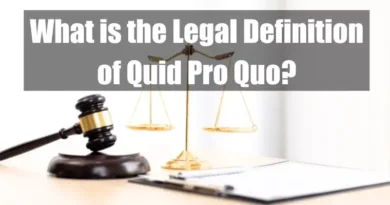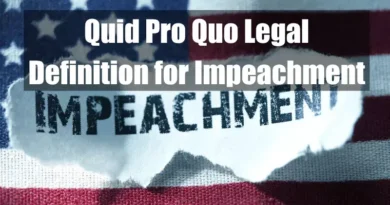Quid Pro Quo Definition vs Bribery
Takeaways
| Key Points |
|---|
| Quid pro quo, meaning “something for something,” refers to a mutual exchange where both parties benefit and agree to transparent terms, such as business partnerships or legal settlements; it is generally legal unless coercion or unethical demands are involved. |
| In contrast, bribery is always illegal and unethical, as it involves offering or receiving something of value to corruptly influence the actions of a person in power, such as a politician accepting money to sway decisions. |
| The key distinctions lie in transparency and intent: quid pro quo can be ethical if both parties willingly agree to fair terms, while bribery is inherently covert and aims to manipulate outcomes. |
| Both, however, share the potential for abuse, with quid pro quo becoming coercive under undue pressure, and bribery being entirely rooted in corruption. |
| Understanding these differences is crucial to navigating ethical dilemmas and maintaining compliance in professional and legal contexts. |
Introduction
Though often confused, quid pro quo and bribery are distinct concepts with different ethical and legal implications. Quid pro quo, a Latin phrase meaning “something for something,” involves a mutual exchange where both parties receive a benefit. This can be legal and ethical if the terms are transparent and agreed upon by both parties, such as a business partnership where services are traded.
In contrast, bribery entails offering, giving, receiving, or soliciting something of value to influence the actions of someone in a position of power. Bribery is always illegal and unethical, often conducted covertly with the intent to corrupt or deceive. For example, a public official accepting money to sway their decision-making constitutes bribery, which carries severe legal penalties. Understanding these differences is essential for maintaining ethical standards and legal compliance in professional and personal dealings.
What is Quid Pro Quo?

Definition
Quid pro quo, which translates to “something for something,” refers to a situation where one party provides a benefit in return for something of equal or greater value. This concept is prevalent in various domains, including legal, business, and everyday contexts. Essentially, quid pro quo involves a mutual agreement in which each party expects to receive a benefit.
Examples in Various Contexts
- Legal: In legal contexts, quid pro quo arrangements are common in settlements where one party agrees to a condition in exchange for dropping charges or lawsuits.
- Business: It is a trade agreement where goods or services are exchanged.
- Employment: In employment settings, it could involve promotions or raises in return for specific performances or favors.
Legal Considerations
While quid pro quo itself is not inherently illegal, it becomes problematic when it involves unethical or coercive elements. For instance, quid pro quo sexual harassment, where job benefits are contingent on sexual favors, is illegal under employment laws.
What is Bribery?

Definition
Bribery involves offering, giving, receiving, or soliciting something of value to influence an individual’s actions in a position of power. Unlike quid pro quo, bribery always carries a negative connotation and is universally considered unethical and illegal.
Examples in Various Contexts
- Political: A politician accepting money to influence their vote on legislation.
- Corporate: An executive receiving gifts from a supplier in exchange for favorable treatment.
- Judicial: A judge accepting payment to alter the outcome of a case.
Legal Implications
Bribery is illegal in all jurisdictions and punishable by severe penalties, including imprisonment and fines. Anti-bribery laws are stringent to maintain fairness and integrity within the public and private sectors.
Key Differences Between Quid Pro Quo and Bribery
Nature of Exchange
- Quid Pro Quo: Involves a mutual, often transparent, exchange where both parties agree to the terms and benefits.
- Bribery: Involves an attempt to influence or corrupt, often conducted covertly and with the intent to undermine integrity.
Ethical and Legal Standing
- Quid Pro Quo: Can be legal and ethical, depending on the context and nature of the exchange.
- Bribery: Always unethical and illegal, with significant legal repercussions.
Transparency
- Quid Pro Quo: Generally more transparent, with clear terms agreed upon by both parties.
- Bribery: Often hidden, with the intent to deceive or corrupt.
Contextual Examples: Legal vs. Illegal Scenarios
- Quid Pro Quo: A legal and ethical quid pro quo involves a company negotiating a partnership in which both companies benefit equally.
- Bribery: A company offering a government official a luxury trip in return for favorable regulatory decisions is illegal bribery.
Similarities Between Quid Pro Quo and Bribery
Exchange of Benefits
Both quid pro quo and bribery involve the exchange of benefits. In both cases, one party offers something of value, expecting to receive something in return. This commonality often leads to confusion between the two terms.
Potential for Abuse
Both concepts have the potential for abuse. Quid pro quo can become coercive or unethical if it involves undue pressure or inappropriate conditions. Similarly, bribery is inherently abusive, aiming to influence the actions of individuals in power corrupt or unduly.
Influence on Decision-Making
In both scenarios, the exchange influences decision-making processes. In quid pro quo, the influence can be neutral or positive if the exchange is fair and transparent. However, in bribery, the influence is always negative, aiming to corrupt or manipulate decisions unfairly.
Case Studies and Real-World Examples
Quid Pro Quo in Business Deals
Consider a scenario where two companies agree to collaborate. Company A offers marketing services to Company B. In return, Company B provides legal support to Company A. This arrangement, if transparent and consensual, constitutes a legal and ethical quid pro quo.
Bribery in Politics
A high-profile case involved a politician who accepted large sums of money from a corporate entity to vote in favor of legislation beneficial to that entity. This act of bribery led to legal action and imprisonment, highlighting the severe consequences of such illegal activities.
The Gray Areas
Ethical Dilemmas
While quid pro quo can be ethical, certain situations blur the lines. For example, suppose an employer subtly suggests that an employee’s job security depends on personal favors. In that case, it strays into unethical territory, resembling coercion.
Cultural Perspectives
Different cultures have varying tolerance levels for practices resembling quid pro quo. What is considered a normal business practice in one culture might be seen as unethical or borderline bribery in another.
Legal Frameworks and Protections
Anti-Bribery Laws
Many countries have stringent anti-bribery laws, such as the Foreign Corrupt Practices Act (FCPA) in the United States and the Bribery Act in the United Kingdom. These laws aim to prevent bribery and promote transparency.
Quid Pro Quo Regulations
While quid pro quo arrangements are not inherently illegal, specific regulations prevent coercive or unethical practices, especially in employment and politics. Anti-harassment laws, for instance, strictly prohibit quid pro quo harassment.
Conclusion
Understanding the distinction between quid pro quo and bribery is crucial for navigating ethical and legal landscapes. Quid pro quo involves mutual exchanges that can be ethical and legal, while bribery is inherently unethical and illegal. Recognizing these differences and their similarities helps maintain integrity in professional and personal interactions, ensuring fair and transparent practices.
FAQ
What are quid pro quo and bribery?
Quid pro quo is a Latin term meaning “something for something,” used to describe a mutually agreed exchange of benefits that is lawful when conducted transparently. In contrast, bribery involves offering or receiving something of value with corrupt intent to influence decisions improperly. While both involve exchanges, quid pro quo is based on fair, reciprocal agreements, whereas bribery undermines fairness through secretive, unethical inducements.
How do exchange principles differ in quid pro quo and bribery?
Both concepts center on the exchange of benefits; however, in a quid pro quo, the exchange is clear, transparent, and mutually beneficial—often forming the basis of contracts or employment arrangements. With bribery, the exchange is designed to covertly secure an advantage or influence an outcome, lacking the equitable balance and openness found in legitimate transactions.
How does intent affect quid pro quo versus bribery?
Intent is the key factor that separates the two. In a lawful quid pro quo, the intent is to create a mutually beneficial arrangement without hidden motives. In bribery, the intent is corrupt; the party offering the bribe seeks to improperly sway decisions or secure preferential treatment, which violates ethical and legal standards.
How does “consideration” compare with a “thing of value”?
In quid pro quo arrangements, “consideration” refers to the legally recognized benefit exchanged between parties that supports a binding contract. Conversely, in bribery, any “thing of value”—whether money, gifts, or favors—is given with the ulterior motive of corruptly influencing a decision. The difference lies in the legitimacy of the exchange: consideration is fair and negotiated, while a thing of value in bribery is meant to distort impartial judgment.
What role does reciprocity play in both practices?
Reciprocity is fundamental to quid pro quo, where both parties agree to provide benefits in exchange for services or actions, ensuring balance and transparency. In bribery, however, the reciprocity is distorted by a hidden agenda; one party uses the exchange to illicitly secure an advantage, undermining the fairness and integrity expected in a transparent, reciprocal relationship.
How are facilitation payments viewed in these contexts?
Facilitation payments are small amounts paid to expedite routine governmental actions. They may resemble a quid pro quo when transparently recorded and mutually recognized as part of a regular process. However, if such payments are used to accelerate decisions or bypass normal procedures improperly, they cross into bribery by subverting fair administrative practices.
What impact does undue influence have on these exchanges?
Undue influence occurs when one party leverages power or authority to manipulate another, skewing what should be an even-handed exchange. In a proper quid pro quo, both sides participate freely. Still, when undue influence is present, as is often the bribery case, the exchange becomes coercive rather than consensual, undermining ethical standards and legal norms.
How do official acts connect with quid pro quo and bribery?
Official acts involve decisions made by public officials within their formal duties. A quid pro quo involving an official act can be lawful if it is part of a transparent and mutually beneficial arrangement. In bribery, however, offering or receiving benefits to influence an official act violates ethical and legal standards by compromising the integrity of public decision-making.
What distinguishes kickbacks from legitimate exchanges?
Kickbacks are illicit payments where a portion of a contract’s value is secretly returned to the party that helped secure the deal, representing a form of bribery. In contrast, a legitimate quid pro quo is characterized by openly negotiated and documented exchanges, ensuring that both parties benefit without hidden incentives. The secretive nature and corrupt intent of kickbacks set them apart from lawful exchanges.
How does the pay-to-play concept apply to both?
The term “pay-to-play” describes a scenario where payments are required to gain access or preferential treatment. In a legitimate quid pro quo, any payment is part of a transparent, competitive process with clear benefits for both parties. When pay-to-play practices are used to secure undue advantage or bypass fair competition, they align with bribery, as the exchange is driven by improper incentives rather than honest negotiation.
How do anti-corruption laws address these exchanges?
Anti-corruption laws are designed to differentiate between legitimate, mutually beneficial quid pro quo arrangements and corrupt bribery schemes. These laws focus on the transparency of the exchange, the intent behind it, and whether it influences decisions improperly. When an exchange is conducted openly and fairly, it remains within legal bounds; when it is shrouded in secrecy and aimed at distorting outcomes, it is subject to legal penalties such as bribery.
How does transparency distinguish quid pro quo from bribery?
Transparency ensures that the terms of an exchange are open and documented, a key characteristic of lawful quid pro quo arrangements. In bribery, the lack of transparency is deliberate; hidden transactions are used to influence decisions without public scrutiny. This absence of openness is a red flag for corrupt practices and is one of the main factors differentiating bribery from ethical exchanges.
What ethical standards govern these practices?
Ethical standards require that all exchanges be conducted fairly, with mutual consent and full disclosure. Quid pro quo arrangements that adhere to these standards contribute to trust and accountability. In contrast, bribery inherently violates these ethical norms by involving secret, coercive, or manipulative elements designed to obtain an unfair advantage, thereby eroding public and organizational trust.
How do legal frameworks ensure ethical exchanges versus corruption?
Legal frameworks for contracts and public administration demand clear, documented evidence of mutual benefit and legitimate consideration. They safeguard against corruption by setting strict guidelines and penalties for any exchange that veers into bribery. These frameworks help ensure that quid pro quo transactions remain ethical while providing mechanisms to detect and punish corrupt practices when the exchange is used to subvert fair processes.
How can organizations prevent corruption in exchanges?
Organizations can prevent corruption by establishing robust compliance programs emphasizing transparency, clear transaction documentation, and regular audits. Training employees on the differences between legitimate quid pro quo arrangements and bribery ensures that exchanges are ethical and within legal boundaries. By fostering a culture of integrity and accountability, companies can effectively mitigate the risk of covert, unethical exchanges that could lead to corruption.









